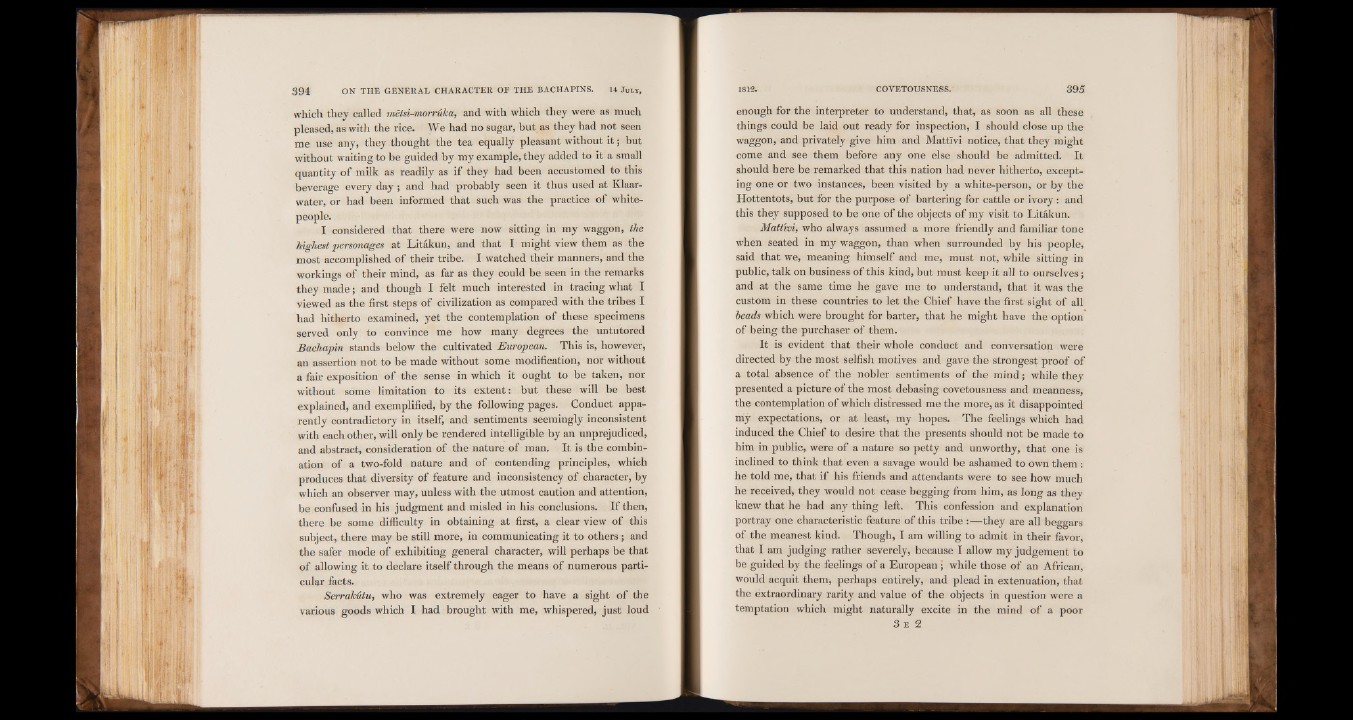
which they called metd-morruka, and with which they were as much
pleased, as with the rice. We had no sugar, but as they had not seen
me use any, they thought the tea equally pleasant without it ; but
without waiting to be guided by my example, they added to it a small
quantity of milk as readily as if they had been accustomed to this
beverage every day; and had probably seen it thus used at Klaar-
water, or had been informed that such was the practice of white-
people.
I considered that there were now sitting in my waggon, the
highest personages at Litakun, and that I might view them as the
most accomplished of their tribe. I watched their manners, and the
workings of their mind, as far as they could be seen in the remarks
they made; and though I felt much interested in tracing what I
viewed as the first steps of civilization as compared with the tribes I
had hitherto examined, yet the contemplation of these specimens
served only to convince me how many degrees the untutored
Bachapin stands below the cultivated European. This is, however,
an assertion not to be made without some modification, nor without
a fair exposition of the sense in which it ought to be taken, nor
without some limitation to its extent: but these will be best
explained, and exemplified, by the following pages. Conduct apparently
contradictory in itself, and sentiments seemingly inconsistent
with each other, will only be rendered intelligible by an unprejudiced,
and abstract, consideration of the nature of man. It is the combination
of a two-fold nature and of contending principles, which
produces that diversity of feature and inconsistency of character, by
which an observer may, unless with the utmost caution and attention,
be confused in his judgment and misled in his conclusions. If then,
there be some difficulty in obtaining at first, a clear view of this
subject, there may be still more, in communicating it to others; and
the safer mode of exhibiting general character, will perhaps be that
of allowing it to declare itself through the means of numerous particular
facts.
Serrakutu, who was extremely eager to have a sight of the
various goods which I had brought with me, whispered, just loud
enough for the interpreter to understand, that, as soon as all these
things could be laid out ready for inspection, I should close up the
waggon, and privately give him and Mattivi notice, that they might
come and see them before any one else should be admitted. It
should here be remarked that this nation had never hitherto, excepting
one or two instances, been visited by a white-person, or by the
Hottentots, but for the purpose of bartering for cattle or ivory: and
this they supposed to be one of the objects of my visit to Litakun.
Mattivi, who always assumed a more friendly and familiar tone
when seated in my waggon, than when surrounded by his people,
said that we, meaning himself and me, must not, while sitting in
public, talk on business of this kind, but must keep it all to ourselves;
and at the same time he gave me to understand, that it was the
custom in these countries to let the Chief have the first sight of all
beads which were brought for barter, that he might have the option"
of being the purchaser of them.
It is evident that their whole conduct and conversation were
directed by the most selfish motives and gave the strongest proof of
a total absence of the nobler sentiments of the mind; while they
presented a picture of the most debasing covetousness and meanness,
the contemplation of which distressed me the more, as it disappointed
my expectations, or at least, my hopes. The feelings which had
induced the Chief to desire that the presents should not be made to
him in public, were of a nature so petty and unworthy, that one is
inclined to think that even a savage would be ashamed to own them:
he told me, that if his friends and attendants were to see how much
he received, they would not cease begging from him, as long as they
knew that he had any thing left. This confession and explanation
portray one characteristic feature of this tribe :—they are all beggars
of the meanest kind. Though, I am willing to admit in their favor,
that I am judging rather severely, because I allow my judgement to
be guided by the feelings of a European; while those of an African,
would acquit them, perhaps entirely, and plead in extenuation, that
the extraordinary rarity and value of the objects in question were a
temptation which might naturally excite in the mind of a poor
3 e 2